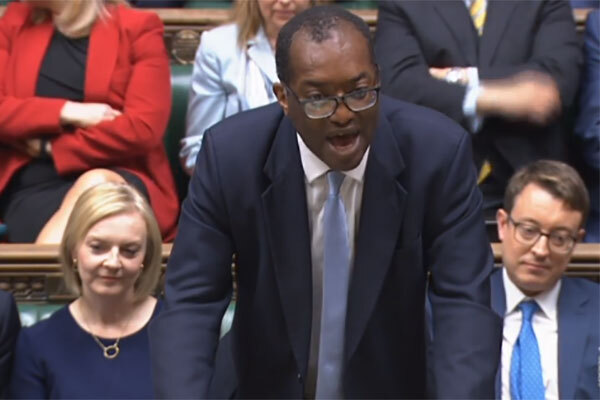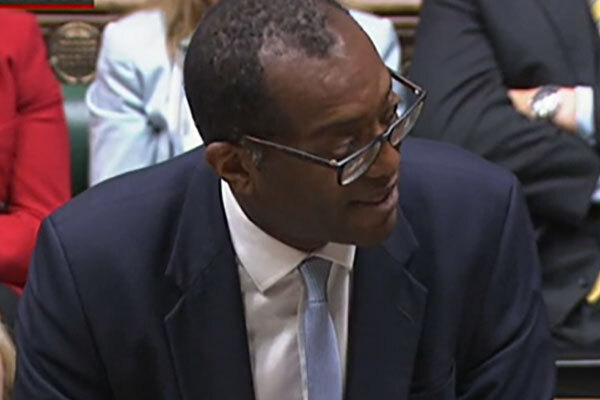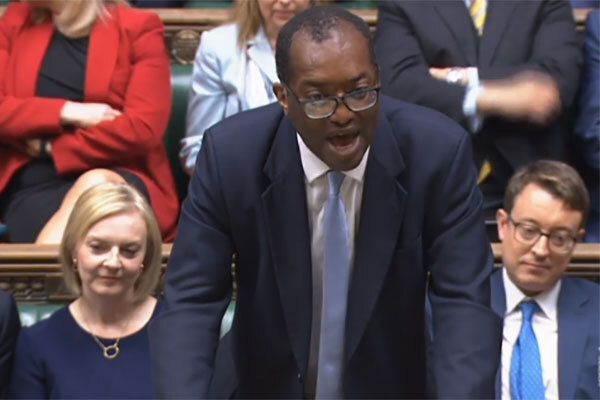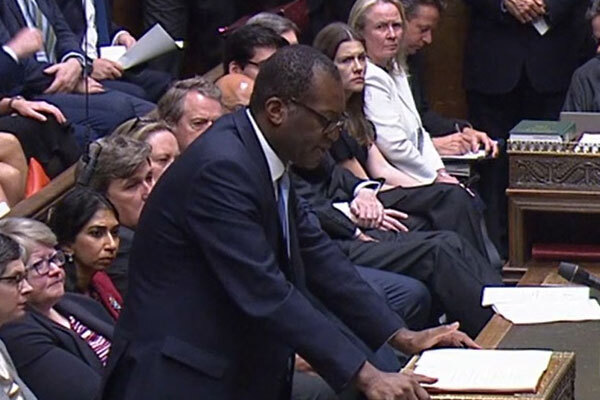You are viewing 1 of your 1 free articles
Mini Budget 2022: the key housing announcements
Kwasi Kwarteng delivered his Mini Budget in the Commons today, with a key focus on driving growth. Inside Housing’s news team takes a look at the key housing announcements from the speech and what they could mean for the sector
‘Growth’ was the word of the day for chancellor Kwasi Kwarteng as he delivered his Mini Budget this morning in the House of Commons.
The policies that make up what he called the new government’s ‘Growth Plan’ aim to “break the cycle of stagnation” and turn it into a “virtuous cycle of growth”, he said.
The chancellor said that he would achieve this through a three-pronged approach, which would see him reform the supply side of the economy, maintaining a responsible approach to public finance and cutting taxes to boost growth.
Within the Budget there are widespread tax cuts, the scrapping of bankers’ bonuses and the reversal of the National Insurance rise.
However, there were a number of important announcements that will have an impact on the housing sector and housing development.
Inside Housing’s news team takes a look at the key policies affecting housing in today’s Mini Budget.
Investment zones
The government believes that by lowering taxes and liberalising planning frameworks, it will encourage development and investment in 38 zones.
In these zones the need for some planning applications will be minimised and where they remain necessary, they will be radically streamlined. Development sites may be co-located with or separate to tax sites, depending on what makes the most sense for the local economy.
Businesses in designated areas in investment zones will benefit from 100% business rate relief on newly occupied and expanded premises, while local authorities hosting a zone will receive 100% of the business rates growth above an agreed baseline for 25 years.
This is alongside full stamp duty land tax relief for businesses on land bought for commercial or residential development, and a zero rate for employer National Insurance contributions on new employee earnings up to £50,270 per year.
To incentivise investment there will be a 100% first year enhanced capital allowance relief for plant and machinery used within designated sites, and accelerated enhanced structures and buildings allowance relief of 20% per year.
The government is in discussions with 38 local authorities to establish investment zones in England and plans to deliver a similar opportunity in Scotland, Wales and Northern Ireland.
Mayoral combined authorities that host a zone will receive a single local growth settlement in the next Spending Review period.
The selection criteria for investment zones, the process for designating sites within one and details on liberalising planning in these areas will be set out in due course.
In his announcement, the chancellor also took aim at the planning system, which he described as “too slow and fragmented”.
A new Planning Bill?
In an attempt to fix this, he promised to bring forward a new bill in the coming months to help “unpack that complex patchwork” of planning restrictions.
Mr Kwarteng did not mention what will happen to the Levelling Up and Regeneration Bill as a result, but several reports yesterday suggested that it is likely to be scrapped.
Alongside reforms to the planning system, the government said it will increase the disposal of surplus government land to build new houses.
Stamp duty cut
As had been rumoured, the government has made cuts to stamp duty, doubling the threshold from £125,000 to £250,000 in England and Northern Ireland with immediate effect.
First-time buyers, who until today paid no stamp duty on homes costing up to £300,000, will see that threshold rise to £425,000 pounds, Mr Kwarteng announced. They will also see the threshold for relief – meaning they pay 5% stamp duty – increase from £500,000 to £625,000.
The chancellor said the cuts would take 200,000 home buyers, including 60,000 first-time buyers, out of paying stamp duty. Supporting documents said the Scottish and Welsh governments, to whom decisions on stamp duty are devolved, would receive funding through their agreed fiscal frameworks “to allocate as they see fit”.
A factsheet accompanying Mr Kwarteng’s statement claimed that doubling the nil-rate band will enable up to 29,000 more people to move home each year, “in turn boosting household consumption, which will increase confidence in the economy and support thousands of businesses who rely on the property market” such as estate agents, builders and removal firms.
Universal Credit changes
In a move that may not go down well alongside the scrapping of the cap on bankers’ bonuses, thousands more low-paid workers will be at risk of losing their benefits from January 2023.
Following the announcements today, around 120,000 more people claiming Universal Credit will be forced into a much more intensive job search regime or risk having their benefits cut.
Mr Kwarteng said that “with more vacancies than unemployed people to fill them, we need to encourage people to join the labour market”.
In a bid to achieve this, his plan involves increasing the Administration Earnings Threshold (AET), which puts people into different work search ‘regimes’.
The threshold, which means the difference between the Intensive Work Search (IWS) labour market regime and the Light Touch (LT) labour market regime, determines whether claimants are required to search for work.
As it stands, claimants working up to nine hours a week at the National Living Wage could have their benefits cut if they do not take action to increase what they earn. This was due to increase to 12 hours on 26 September.
But the chancellor went even further, announcing a jump to 15 hours from January. It means thousands more people will be expected to actively search for work and attend weekly or fortnightly appointments at a job centre.
Labour’s shadow work and pensions secretary Jonathan Ashworth called for a “serious plan”, tweeting: “So Tory ministers think [the] reason we have over a million vacancies is because the low paid aren’t working hard enough and need to be threatened with sanctions but bankers need bumper bonuses.”
Energy
Tackling rising energy prices was a key part of Mr Kwarteng’s fiscal plans.
Some key announcements on how the government would support people were made earlier this month, with the energy bill cap for households and, more recently, businesses.
This was reiterated in today’s speech, with Mr Kwarteng stating that the cap was expected to save households at least £1,000 a year on energy bills.
The chancellor said that while the plan would come at a cost, £60bn to be precise, the intervention is right and the fall-out of inaction would cost much more.
The cap also sees the government cover the green energy levies, around £150 a year for consumers.
However, there were additional giveaways in the Mini Budget documents that would see money given to improve energy efficiency.
This included the government bringing forward legislation to implement new obligations on energy suppliers to help hundreds of thousands of their customers take action to reduce their energy bills, delivering an average saving of around £200 a year.
This scheme, which would start in April 2023, is expected be worth £1bn over the next three years.
And there was also the announcement of a new £2.1bn fund over the next two years, which would support local authorities, housing associations, schools and hospitals to invest in energy efficiency and renewable heating.
The list of potential investment zones
- Blackpool Council
- Bedford Borough Council
- Central Bedfordshire Council
- Cheshire West and Chester Council
- Cornwall Council
- Cumbria County Council
- Derbyshire County Council
- Dorset Council
- East Riding of Yorkshire Council
- Essex County Council
- Greater London Authority
- Gloucestershire County Council
- Greater Manchester Combined Authority
- Hull City Council
- Kent County Council
- Lancashire County Council
- Leicestershire County Council
- Liverpool City Region
- North East Lincolnshire Council
- North Lincolnshire Council
- Norfolk County Council
- North of Tyne Combined Authority
- North Yorkshire County Council
- Nottinghamshire County Council
- Plymouth City Council
- Somerset County Council
- Southampton City Council
- Southend-on-Sea City Council
- Staffordshire County Council
- Stoke-on-Trent City Council
- Suffolk County Council
- Sunderland City Council
- South Yorkshire Combined Authority
- Tees Valley Combined Authority
- Warwickshire County Council
- West of England Combined Authority
- West Midlands Combined Authority
- West Yorkshire Combined Authority
Sign up for our daily newsletter
Already have an account? Click here to manage your newsletters












